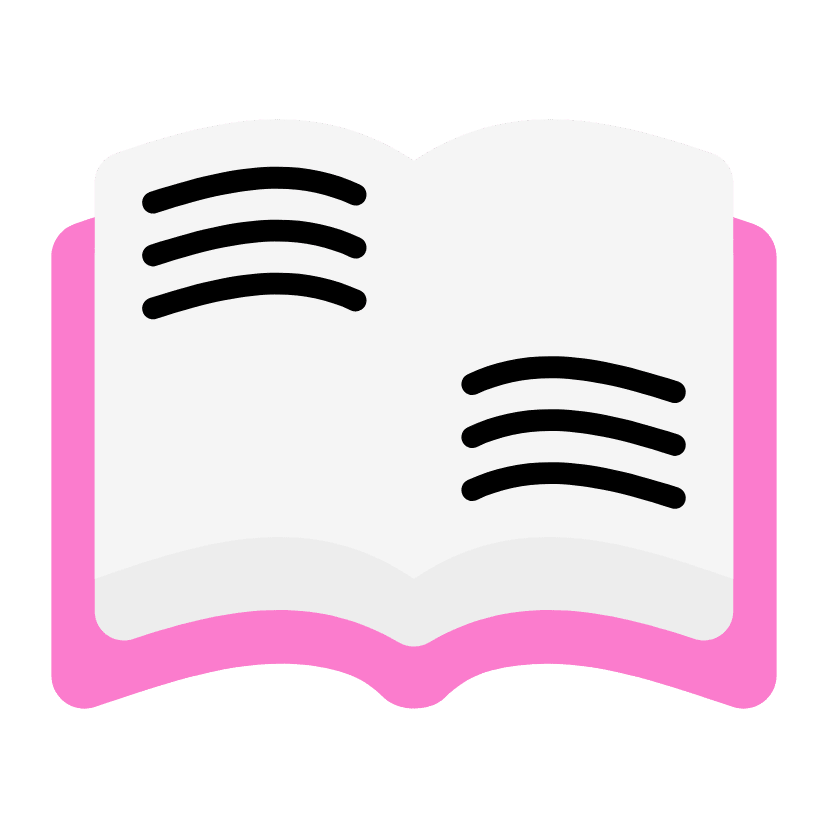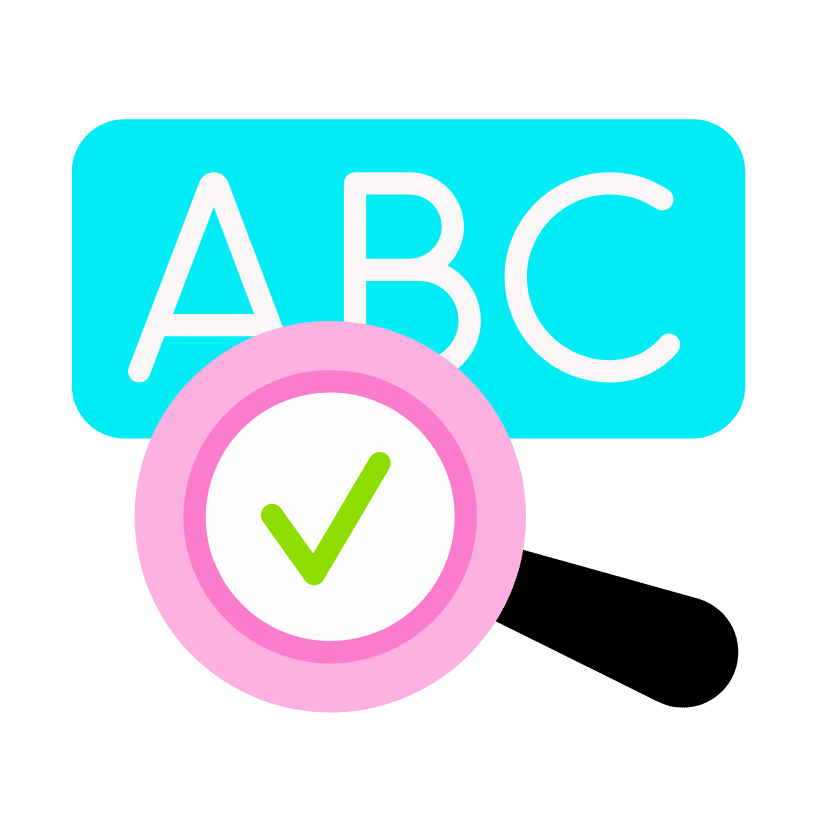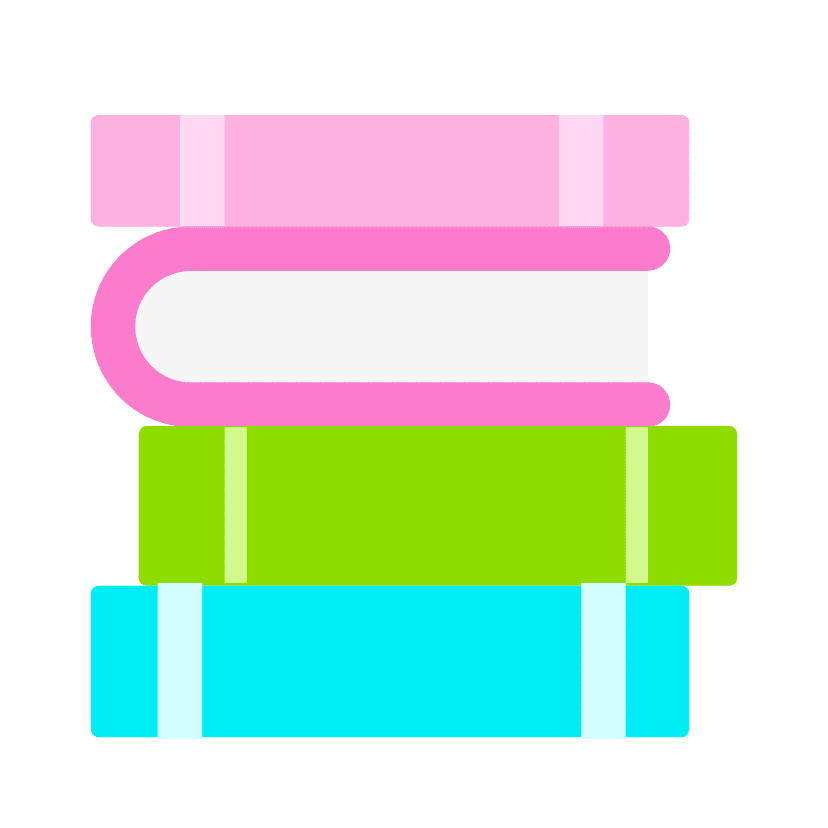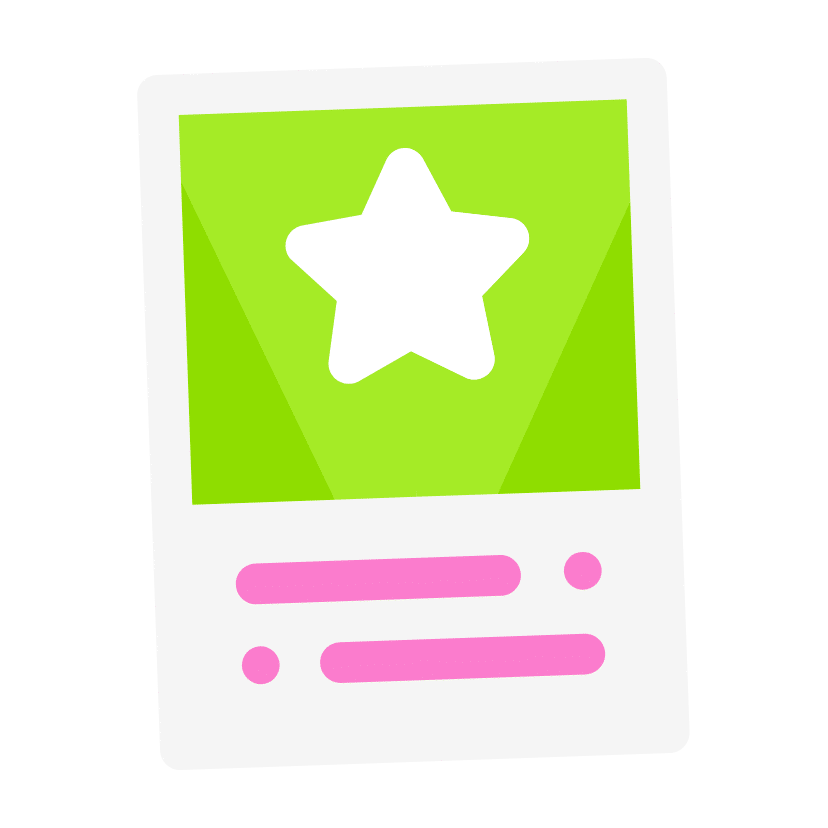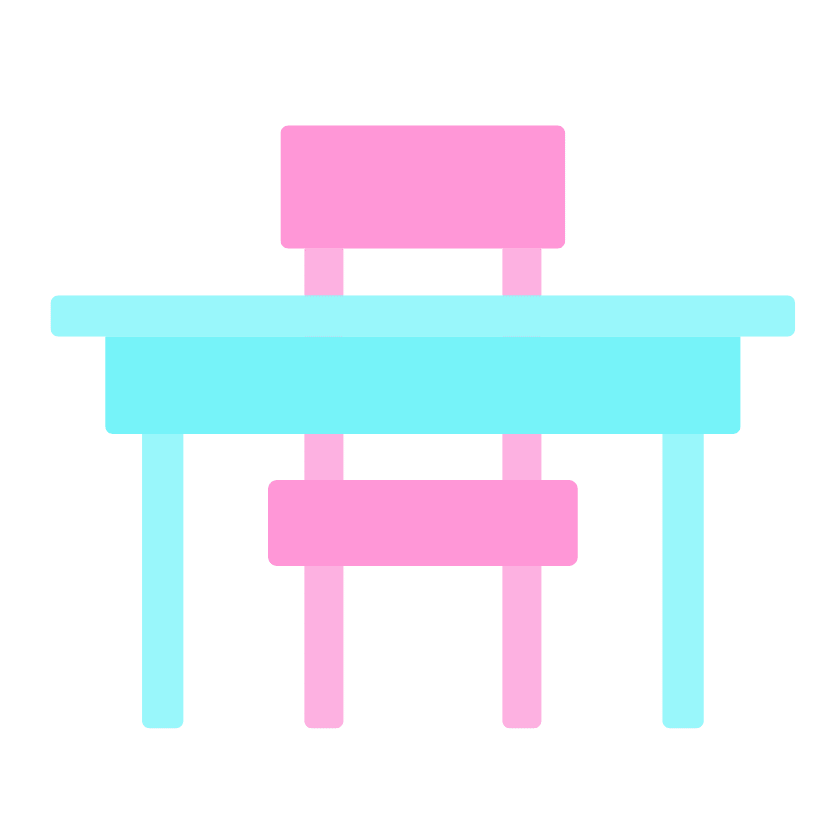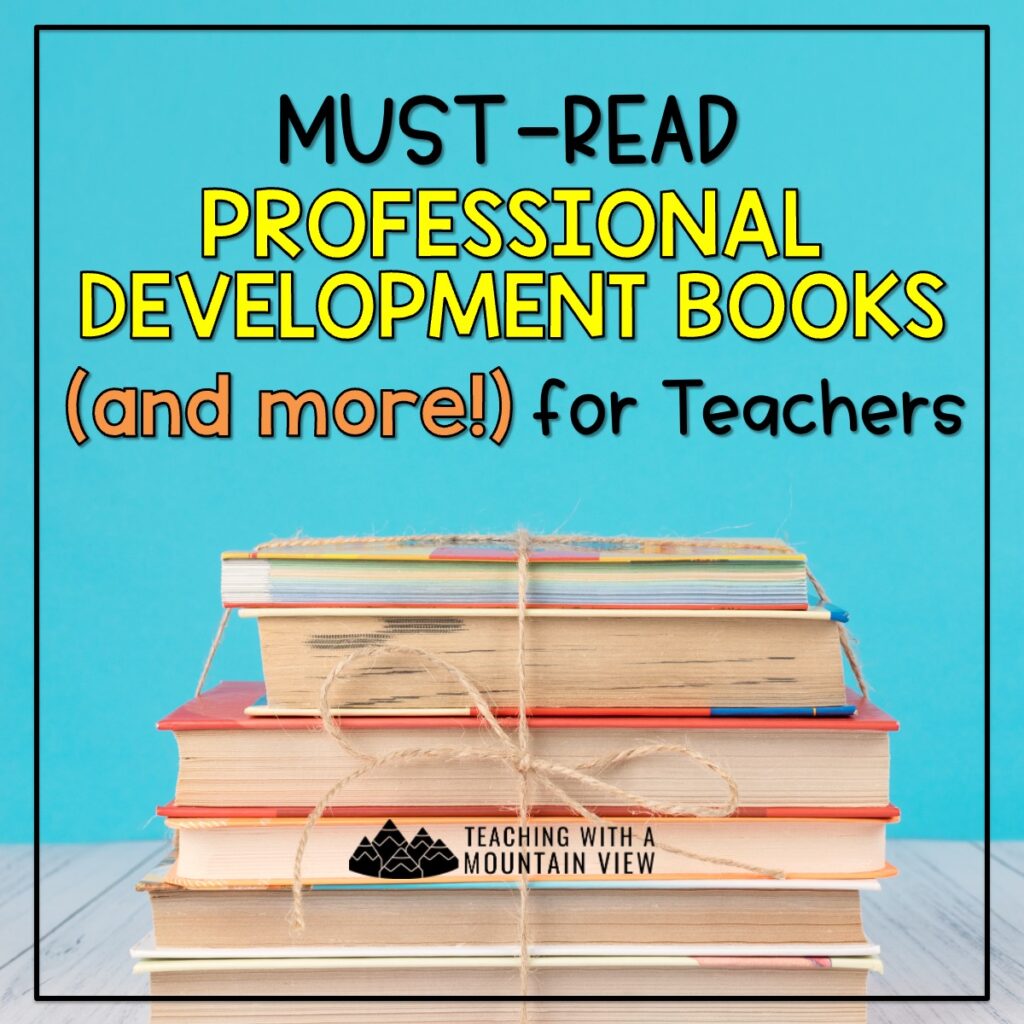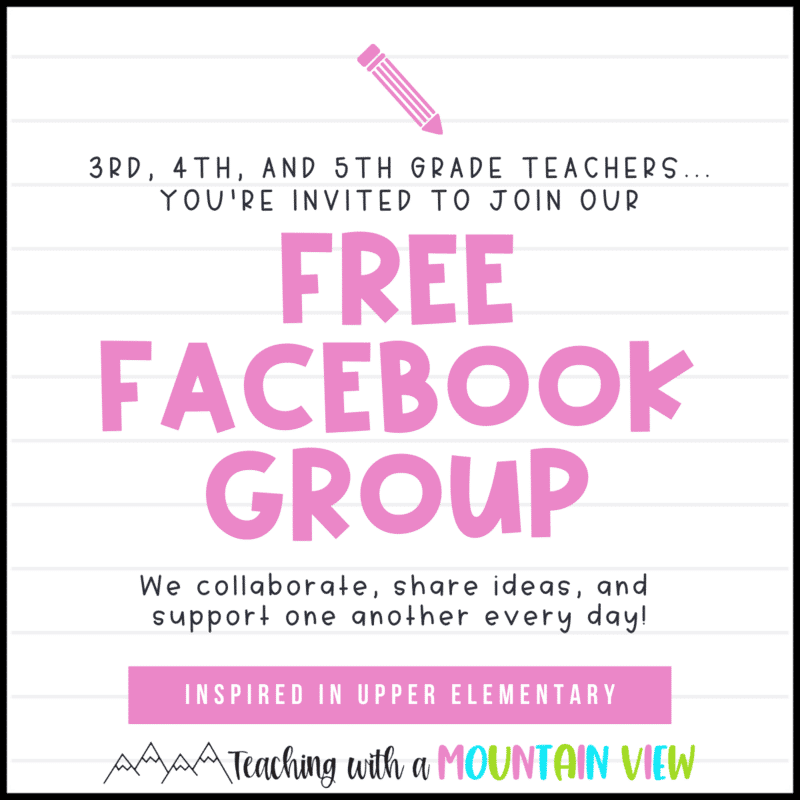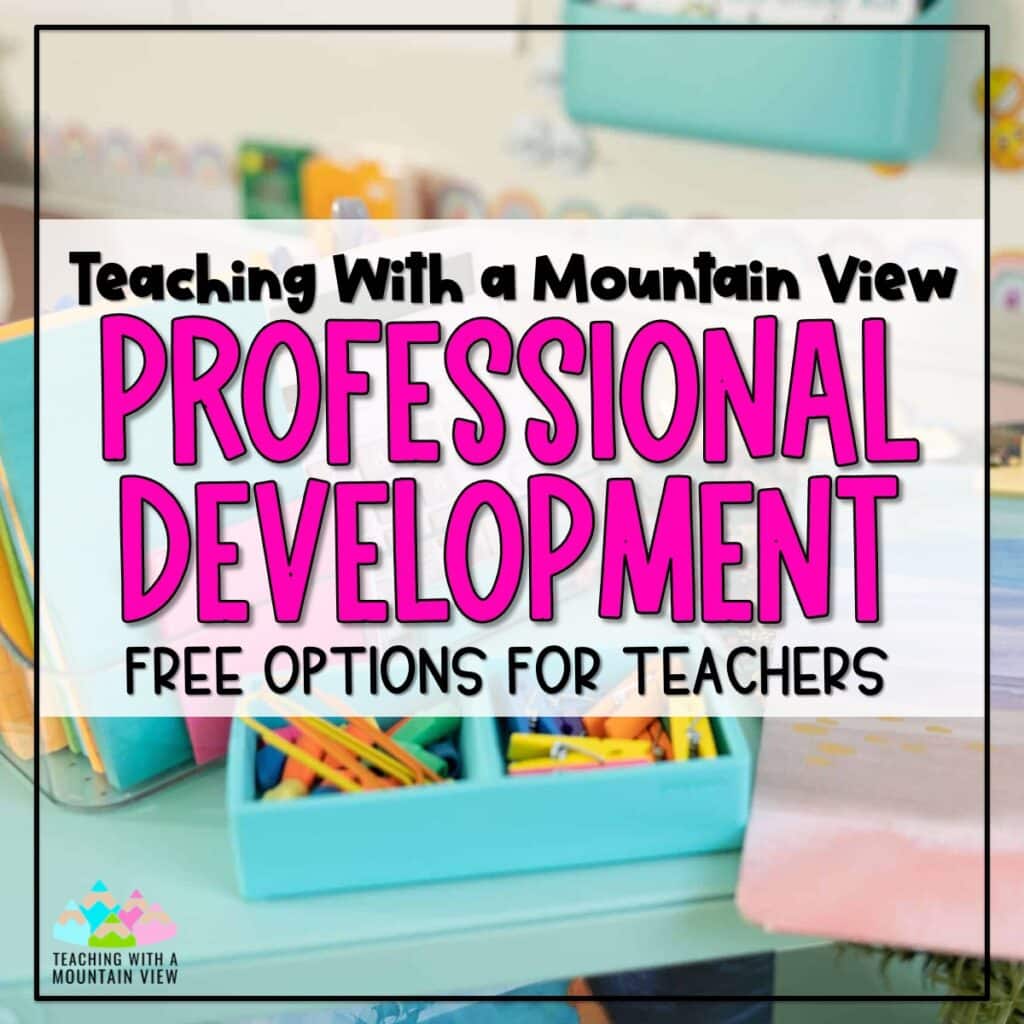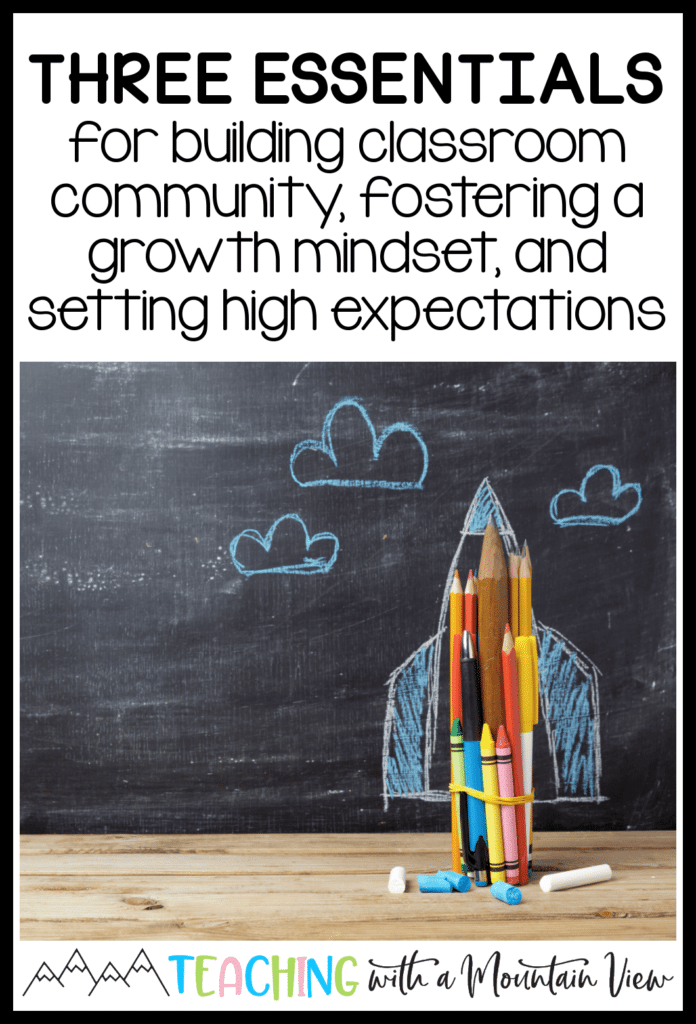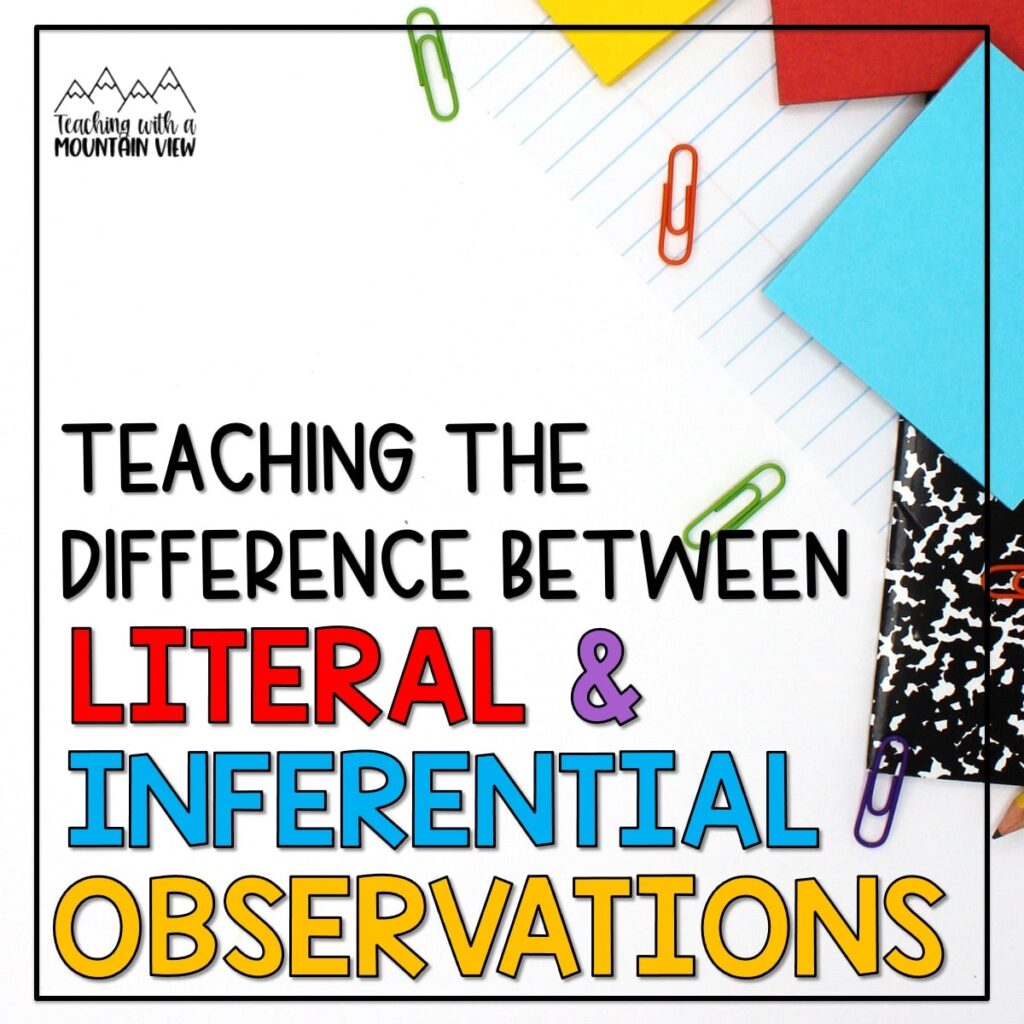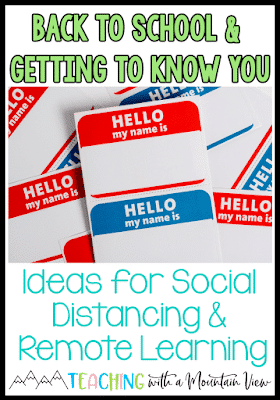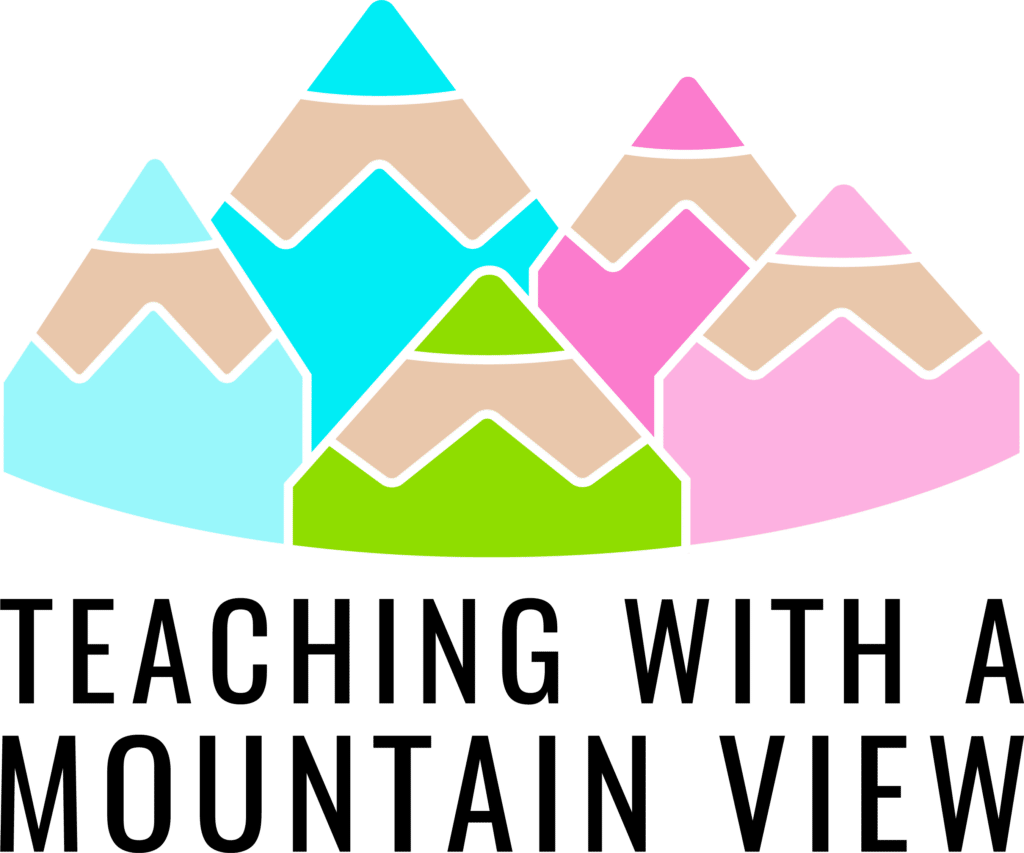Professional Development Books for Teachers
By Mary Montero
Share This Post:
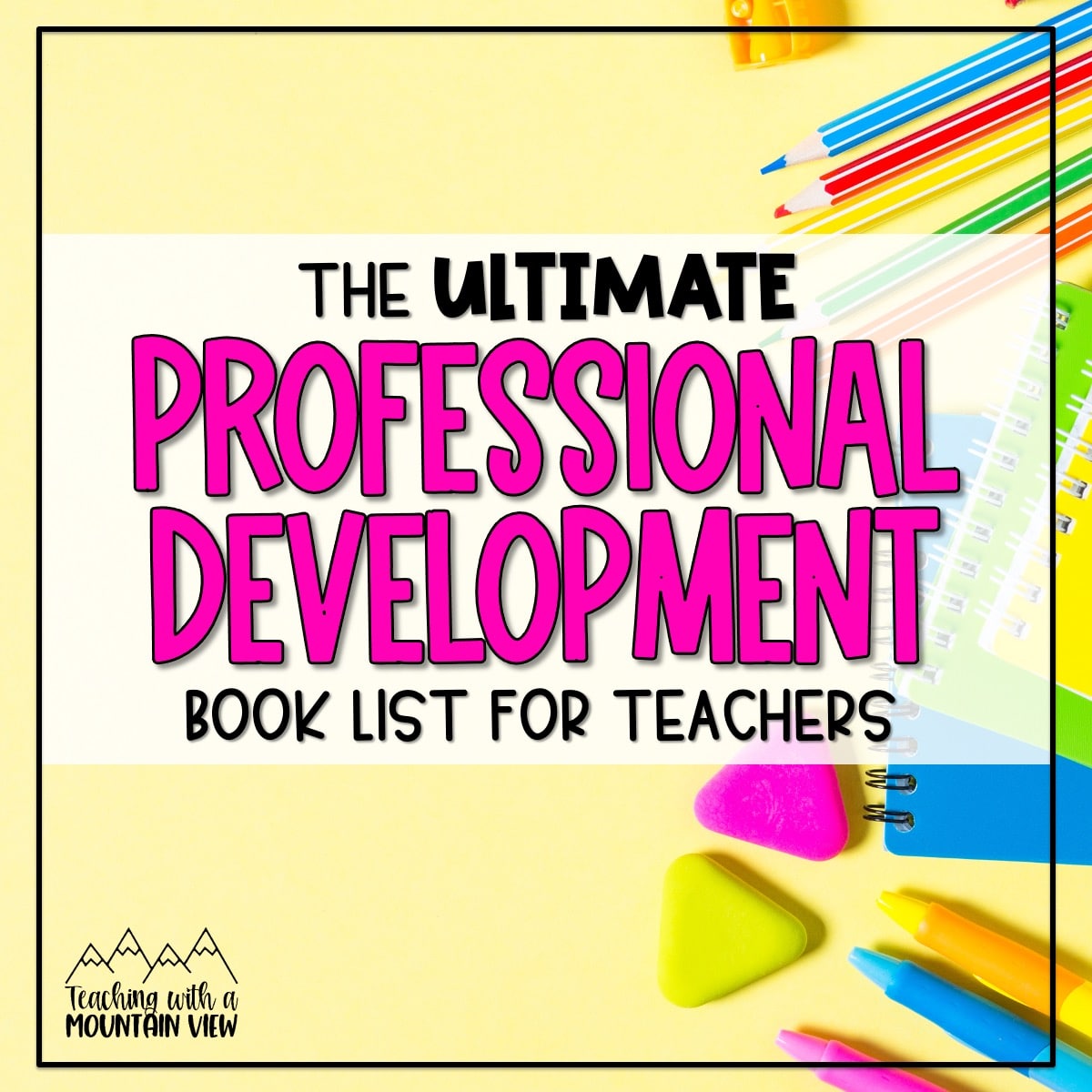
Looking for a summer reading list of professional development books for teachers? Maybe you are looking for some new teaching ideas or need a crash course in classroom management. Or you might want to hear some inspiring tales to remind you why you started teaching. No matter your need, there is a good teacher book out there that can help. The world of professional development books for teachers has exploded and there’s no better time than now to grab a good book that will help you become a better teacher.
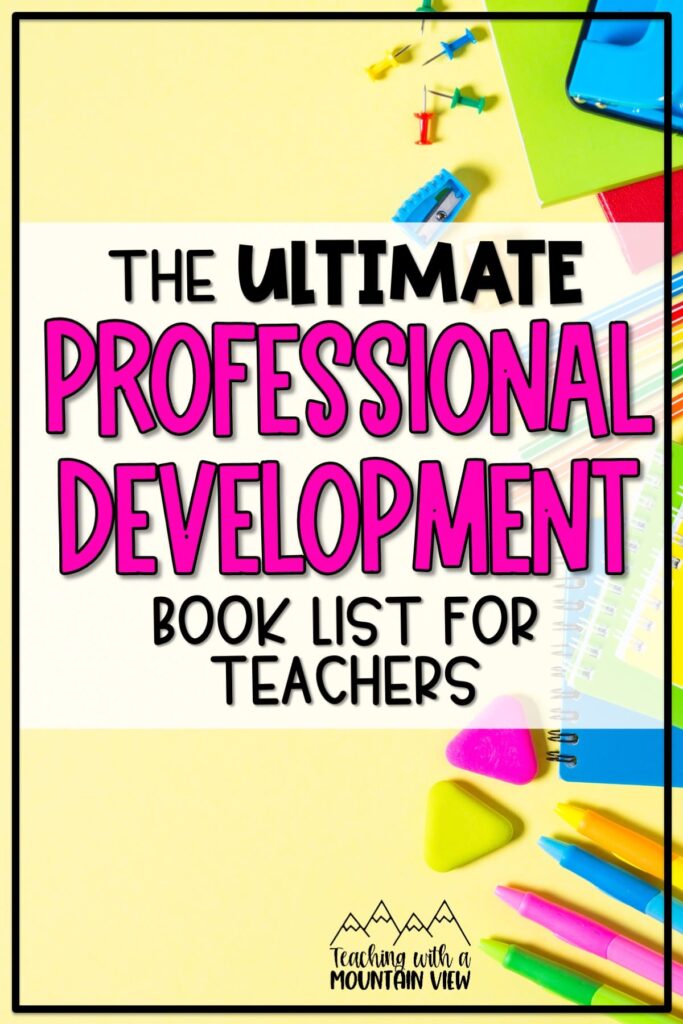
I have scoured the book stores, talked with my teacher friends, and even asked my virtual teacher friends about their favorite professional development books for teachers and now I am putting them all together in one place. The titles below are Amazon affiliate links.
Looking for more free professional development opportunities for teachers? Enter your email below and I’ll send you the complete list!
Inspiring Professional Development Books for Teachers
Sometimes as a teacher, you need to be reminded why you do what you do. The books in this category are inspiring and insightful. They remind us why we wanted to become a teacher, and they challenge us to be a better one.
Teach Like a Pirate by Dave Burgess
Are you down to incorporate some funky and creative teaching practices? This book offers inspiration, practical techniques, and innovative ideas that will help you to increase student engagement, boost your creativity, and transform your life as an educator.
The Freedom Writers Diary by Erin Gruwell
Consisting of narrative text by Erin Gruwell and powerful entries from her students’ diaries, The Freedom Writers Diary is an unforgettable story of how hard work, courage, and determination changed the lives of a teacher and her students.
Teach Like Your Hair’s On Fire by Rath Esquith
This bestseller gives any teacher or parent all the techniques, exercises, and innovations that have made its author an educational icon. From personal codes of behavior to tips on tackling literature and algebra, this book is for anyone concerned about the future of our children.
It Won’t Be Easy by Tom Rademacher
Tom Rademacher wishes someone had handed him this sort of book along with his teaching degree, but first he had to write it. Less a how-to manual than a tribute to an impossible and impossibly rewarding profession, It Won’t Be Easy captures the experience of teaching in all its messy glory.
The Joyful Teacher by Berit Gordon
The Joyful Teacher provides a structure to help K-12 teachers across all content areas reflect on their professional development needs, set goals that work, and access practical strategies that will help them meet those goals.
I Wish My Teacher Knew . . . by Kyle Schwartz
One day, third-grade teacher Kyle Schwartz asked her students to fill-in-the-blank in this sentence: “I wish my teacher knew _____.” The results astounded her. Some answers were humorous, others were heartbreaking – all were profoundly moving and enlightening. The results opened her eyes to the need for educators to understand the unique realities their students face in order to create an open, safe and supportive place in the classroom.
The Essential 55 by Ron Clark
When Ron Clark started teaching fifth grade, he found his students were apathetic and had zero interest in learning. By the end of the year, the students were engaged and reading above grade level. Clark compiled his key findings in this book, The Essential 55.
How Children Succeed by Paul Tough
The story we usually tell is that success comes from intelligence. However, Paul Tough argues that success has more to go with perseverance, curiosity, optimism, and self-control. In this novel, Tough shows how this skills have the power to transform students’ lives.
Books About Classroom Management
Classroom management just might be one of the most important things we do as teachers. Do it well, and the classroom runs smoothly and efficiently leaving lots of time and energy for learning. Here’s some excellent books filled with tips, strategies and ideas for upping your classroom management game.
Interactive Modeling by Margaret Berry Wilson
Interactive modeling can be used to teach various skills, from academics, routines, and behavior. Unlike conventional modeling, interactive modeling lets students take charge, which helps to better retain what they have learned.
Conscious Discipline by Dr. Becky A. Bailey
This book will rock your world and everything you thought you knew about classroom management. Conscious Discipline is an innovative social-emotional learning and classroom management program with a proven track record of sustainable results. Shift from “Do as I say” to “Be the change” with the skills, strategies and structures found in this book.
Better than Carrots or Sticks by Dominique Smith
Classroom management is traditionally a matter of encouraging good behavior and discouraging bad by doling out rewards and punishments. But studies show that when educators empower students to address and correct misbehavior among themselves, positive results are longer lasting and more wide reaching.
The Behavior Code by Jessica Minahan and Nancy Rappaport
Based on a collaboration dating back nearly a decade, the authors—a behavioral analyst and a child psychiatrist—reveal their systematic approach for deciphering causes and patterns of difficult behaviors and how to match them with proven strategies for getting students back on track to learn.
Hacking School Discipline by Nathan Maynard
Replace traditional school discipline with a proven system, founded on restorative justice. In a book that should become your new blueprint for school discipline, Nathan Maynard and Brad Weinstein demonstrate how to eliminate punishment and build a culture of responsible students and independent learners.
Hacking Classroom Management by Mike Roberts
Mike Roberts brings you 10 quick and easy classroom management hacks that will make your classroom the place to be for all your students. He shows you how to create an amazing learning environment that actually makes discipline, rules and consequences obsolete, no matter if you’re a new teacher or a 30-year veteran teacher.
Books About Core Subjects
Whether you are a self-contained teacher or focus on only one core subject, there’s always something new we can learn. These books will have you thinking about your content area teaching in a new way.
The Classroom Chef by John Stevens and Matt Vaudrey
“I just don’t get math.” If you’re a math teacher, you probably can’t count the number of times you’ve heard students, parents, and even fellow teachers make a disparaging statement about your subject. As math teachers and instructional coaches, John Stevens and Matt Vaudrey know how discouraging it feels to look out into a classroom full of disinterested and confused students. But they also know how amazing it feels to see comprehension dawn in their students’ eyes – when a concept suddenly makes sense and math becomes meaningful. In The Classroom Chef, John and Matt share their secret recipes, ingredients, and tips for serving up lessons that engage students and help them “get” math.
Mathematical Mindsets by Jo Boaler
This is one of my favorite pedagogy books of all time. Banish math anxiety and give students of all ages a clear roadmap to success. Mathematical Mindsets provides practical strategies and activities to help teachers and parents show all children, even those who are convinced that they are bad at math, that they can enjoy and succeed in math.
The Book Whisperer by Donalyn Miller
Donalyn Miller says she has yet to meet a child she couldn’t turn into a reader. No matter how far behind Miller’s students might be when they reach her 6th grade classroom, they end up reading an average of 40 to 50 books a year. Miller’s unconventional approach dispenses with drills and worksheets that make reading a chore. Instead, she helps students navigate the world of literature and gives them time to read books they pick out themselves.
The Reading Strategies Book by Jennifer Serravallo
In The Reading Strategies Book, Jennifer Seeavallo collects 300 reading strategies to share with readers in support of thirteen goals-everything from fluency to literary analysis. This is a great book for reading teachers of all grade levels.
Disrupting Thinking by Kylene Beers and Roberts Probst
With their humor and practicality, Beers and Probst present a vision of what reading and education could be across all grade levels. Filled with strategies you can start using in your classroom today, this is a practical resource for all teachers.
The Next Step Forward in Guided Reading by Jan Richardson
This book provides you with all the planning and instructional tools you need to teach guided reading well, from pre-readers to fluent readers. It covers essential strategies for all aspects of reading instruction and includes a variety of assessments, record keeping forms and lesson plans.
You Can’t Just Say it Louder by Debby Murphy
This dynamic book provides the foundation you need to confidently and successfully teach comprehension to a diverse population of students. Filled with innovative, classroom-tested models for differentiating instruction, this professional development resource will leave you feeling empowered, equipped, and excited to implement the strategies!
Unpack Your Impact by Naomi O’Brien and LaNesha Tabb
In a time when the world seems greatly divided, it can feel like walking on eggshells in the classroom. In this novel, O’Brien and Tabb share how they exposed their youngest learners to more perspectives and cultures in social studies by transforming their existing lessons into more inclusive ones.
Books About Student Diversity
Chances are your classroom is filled with diversity. You likely have students of different races, socio-economic backgrounds, intellectual abilities, and learning styles. Being a good teacher in a diverse classroom can be challenging. These books are designed to help you grow and learn in these areas.
Poor Students, Rich Teaching by Eric Jensen
This book focuses on motivating students to learn in the face of poverty. Dr. Eric Jensen clearly defines seven mindsets essential for reaching economically disadvantaged students. He also shares strategies for overcoming adversity and ensuring college and career readiness for all learners, regardless of socioeconomic status.
For White Folks Who Teach in the Hood . . . and the Rest of Y’all Too by Christopher Emdin
Drawing on his own experience of feeling undervalued and invisible in classrooms as a young man of color, and merging his experiences with more than a decade of teaching and researching in urban America, award-winning educator Christopher Emdin offers a new lens on an approach to teaching and learning in urban schools.
Why are all the Black Kids Sitting Together in the Cafeteria by Beverly Daniel Tatum
Walk into any racially mixed high school and you will see Black, White, and Latino youth clustered in their own groups. Is this self-segregation a problem to address or a coping strategy? Beverly Daniel Tatum, a renowned authority on the psychology of racism, argues that straight talk about our racial identities is essential if we are serious about enabling communication across racial and ethnic divides.
What is it About Me You Can’t Teach? by Eleanor Renee Rodriguez
Now in its third edition, this powerful book features timely new content from innovative schools and teachers, focusing on reaching struggling students. Rodriguez illuminates how to raise student achievement by upholding high expectations, while teaching with cultural responsiveness.
Not Light, But Fire by Matthew Kay
Do you feel prepared to initiate and facilitate meaningful, productive dialogues about race in your classroom? Are you looking for practical strategies to engage with your students? Inspired by Frederick Douglass’s abolitionist call to action, “it is not light that is needed, but fire,” Matthew Kay has spent his career learning how to lead students through the most difficult race conversations.
Overcoming Dyslexia by Sally Shaywitz
If you teach reading at any level, this is an amazing resource. From one of the world’s preeminent experts on reading and dyslexia, the most comprehensive, up-to-date, and practical book available on identifying, understanding, and overcoming reading problems.
Differentiation and the Brain by David Sousa
Students are becoming more academically and culturally diverse, making it more important than ever to shift away from a one-size-fits-all approach and toward differentiated instruction. The second edition of this best-selling book will help you create truly effective, brain-friendly classrooms for all learners.
Educated by Tara Westover
While this book isn’t directly related to teaching, it will give you a new perspective on the power that education has to transform a student’s life. In this memoir, Tara details her life raised in an abusive and toxic family where she was not allowed to attend school. As she got older, Tara longed for knowledge, and that journey changed her life.
Pushout by Monique W. Morris
In Pushout, Monique Morris writes about the experiences of black girls in education across the country. She explains how their lives are often misunderstood and judged, leading to stifled potential. This novel challenges it’s readers to demand change in policies, practices, and cultural illiteracy that is pushing numerous black girls out of school and into unsafe futures.
The Teacher Wars by Dana Goldstein
Teaching is equally attacked and admired in America. In The Teacher Wars, Goldstein explores 175 years of public school history that show a long history of teacher strikes and school movements. She looks at common questions we often ask as educators, but the one that sticks out the most is, “How did we get here?”
Books About Teaching Methodology
Trying to stay on top of new teaching methodologies and current trends can be tough, not to mention time consuming. Instead of trying to be and do all the things, I recommend pursuing something that sparks your interest and passion. Here’s some books to get you started.
Keeping the Wonder by Jenna Copper and Ashley Bible
Bible and Copper believe that in order to keep the wonder alive in the classroom, you need four key elements: surprise, curiosity, freedom, and inspiration. In their novel, they offer practical strategies and inspiration that will help you create engaging lessons.
Teach Like a Champion 3.0 by Doug Lemov
Teach Like a Champion gives teachers practical, productive techniques that are based in cognitive science and culturally responsive teaching practices. This book is filled with techniques that will help you turn learning into long-term memory.
The Innovator’s Mindset by George Couros
Kids walk into schools full of wonder and questions. How you, as an educator, respond to students’ natural curiosity can help further their own exploration and shape the way they learn today and in the future. The traditional system of education requires students to hold their questions and compliantly stick to the scheduled curriculum. But our job as educators is to provide new and better opportunities for our students. It’s time to recognize that compliance doesn’t foster innovation, encourage critical thinking, or inspire creativity—and those are the skills our students need to succeed.
Ditch That Textbook by Matt Miller
Are you ready for a change? You know potential exists for innovative, engaging, revolutionary education if you get the right ideas, right tools, and right people, all in the right order. If that sounds like you, then you’re ready to DITCH old mindsets and methods and replace them with empowering, liberating ones.
Make it Stick: The Science of Successful Learning by Peter C. Brown
Drawing on cognitive psychology and other fields, Make It Stick offers techniques for becoming more productive learners, and cautions against study habits and practice routines that turn out to be counterproductive.
The Curious Classroom by Harvey Daniels
Ever wonder how to get students genuinely engaged in your curriculum? Wish you could let them explore those amazing questions they brim with? If so, Daniels provides research-based suggestions that help cover the curriculum by connecting what kids wonder about to the wonders you have to teach them. He shares 10 structures, 34 inspiring models from teachers nationwide, full-color photographs and examples of student work, plus specific suggestions for assessment and grading.
Teaching With the Brain in Mind by Eric Jensen
In easy to understand, engaging language, Jensen provides a basic orientation to the brain and its various systems and explains how they affect learning. After discussing what parents and educators can do to get children’s brains in good shape for school, Jensen goes on to explore topics such as motivation, critical thinking skills, optimal educational environments, emotions, and memory. Jensen’s repeated message to educators is simple: You have far more influence on students’ brains than you realize . . . and you have an obligation to take advantage of the incredible revelations that science is providing.
The Growth Mindset Coach by Annie Brock and Heather Hundley
Studies show that growth mindsets result in higher test scores, improved grades and more in-class involvement. When your students understand that their intelligence is not limited, they succeed like never before. With the tools in this book, you can motivate your students to believe in themselves and achieve anything.
Even More Professional Development Books
We had so many great book recommendations that we had to make another post! Visit this NEW Professional Development Books (and more!) post for no guilt tools and resources to make professional development easy and rewarding. You’ll find a list of must-read professional development books for teachers recommended by current classroom teachers, links to free resources to help you grow as an educator, and practical tips for making the most of the upcoming school year (after a long, relaxing summer!). Whether you’re a brand-new teacher or an experienced professional, you’re sure to find something just for your needs!
Share Your Favorite Professional Development Books For Teachers
I don’t know about you, but my book list just got a lot longer! I can’t wait to dive into some of these books. Have your own favorite professional development books for teachers? Share them with us in our FREE Inspired in Upper Elementary Facebook group. We can’t wait to see what you are reading.
Looking for Student Book Recommendations?
Here are posts with my favorite lists for students!
Free Professional Development for Teachers
You can also visit this page to see more professional development opportunities from Teaching With a Mountain View!
Mary Montero
I’m so glad you are here. I’m a current gifted and talented teacher in a small town in Colorado, and I’ve been in education since 2009. My passion (other than my family and cookies) is for making teachers’ lives easier and classrooms more engaging.

